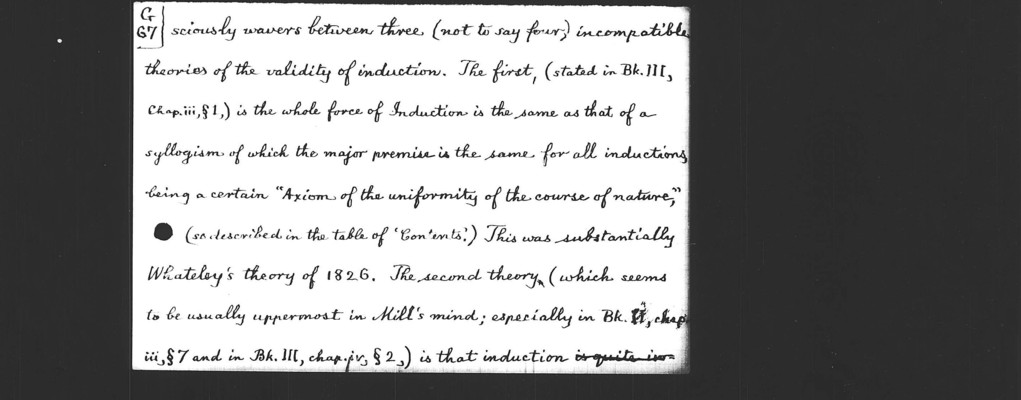Pages
66
G66
for one of the old "quarterlies," and his consequent unfortunate taste for and skill in controversy, which, combined with his having drunk in imbibed his father's wooden sterilizing nominalism with his mother's milk, rendered him, for example, incapable of appreciating Whewell, whose acquaintance with the processes of thought of science was incomparably greater than his own. J. S. Mill's beautiful style, of truly French perfection, together with the bulk of the two thick volumes, prevent all but the keenest readers from perceiving that he unconsciously
67
G67
wavers between three (not to say four,) incompatible theories of the validity of induction. The first, (stated in Bk. III, Chap. iii, §1,) is the whole force of Induction is the same as that of a syllogism of which the major premise is the same for all inductions, being a certain "Axiom of the uniformity of the course of nature," (so described in the table of 'Contents.') This was substantially Whateley's theory of 1826. The second theory (which seems to be usually uppermost in Mill's mind; especially in Bk. II, chap. iii, §7 and in Bk. III, chap. iv, §2,) is that induction is quite in-
68
G68
proceeds as if upon the principle that a predicate which throughout a more or less extensive experience has been uniformly found to be true of all the obj members of a given class that have been examined in this respect may, with little risk, be presumed to be true of every member of that class, without exception; and that while it is not necessary that the inductive reasoner should have this principle clearly in mind, the logician, whose business it partly is to explain why inductions turn out to be true, must recognize the fact
69
G69
the fact that nature is sufficiently uniform to render that quasi principle true, and must recognize that else renders induction a safe and justifiable procedure. This theory is little more than the old maxim that "we must judge of the future by the past," which Mill,—into such unfairness can a pen disposition an inclination toward controversy betray even an eminently fair mind!—attacks as if it merely meant that future history will repeat past history, instead of what it has meant, that future experience wil must be presumed to resemble
70
G70
past experience under sufficiently similar conditions. The third theory (See Bk. III, chap. iii, §3,) is that nature as a whole is not absolutely uniform, variety being a far more prominent characteristic of it; and that such uniformity as there is, is "a mere tissue of partial regularities," each consisting in the fact that certain some classes of objects show a greater, and some a less, tendency, to be as regards certain classes of characters, of to be, or to tendency to a resemblance of all their members in respect to certain lines of characters; and that whoever knows this




